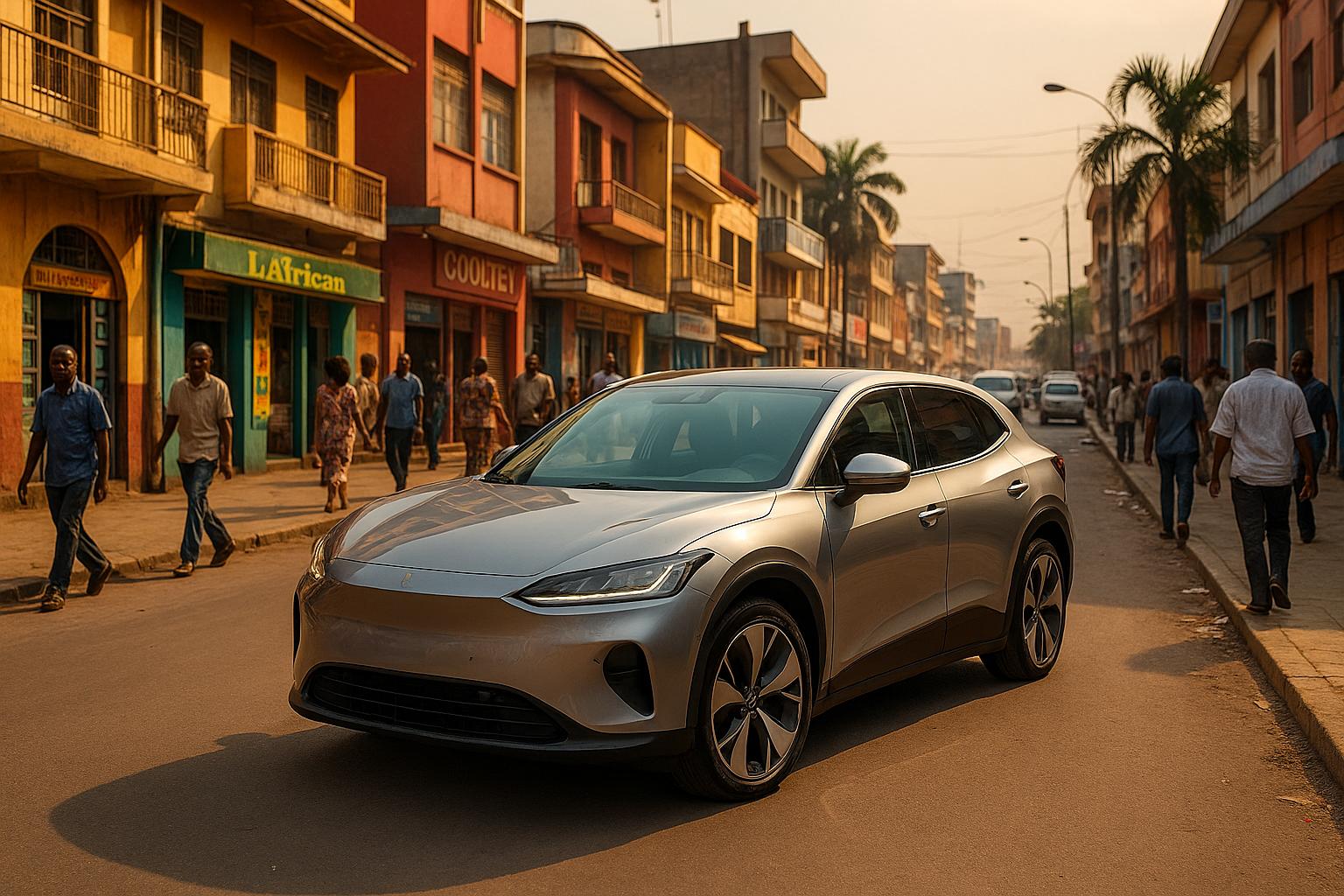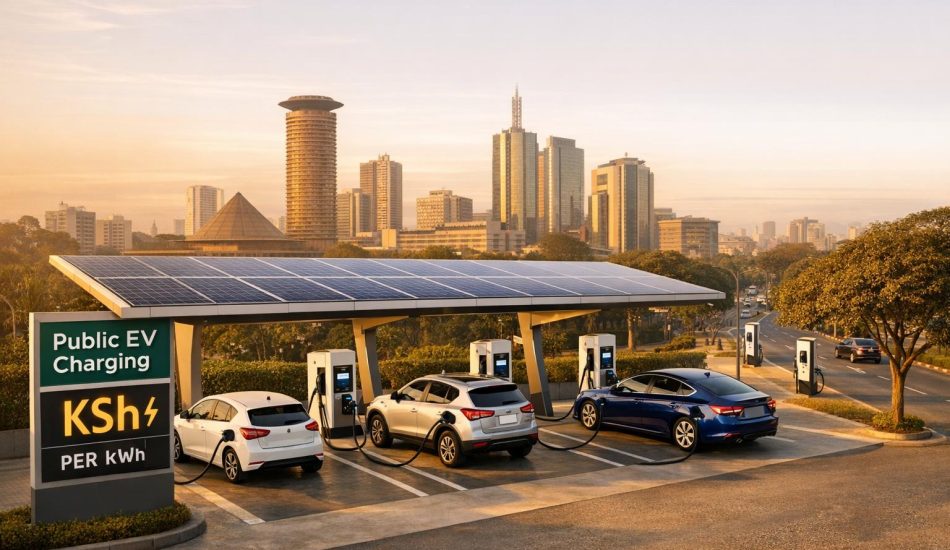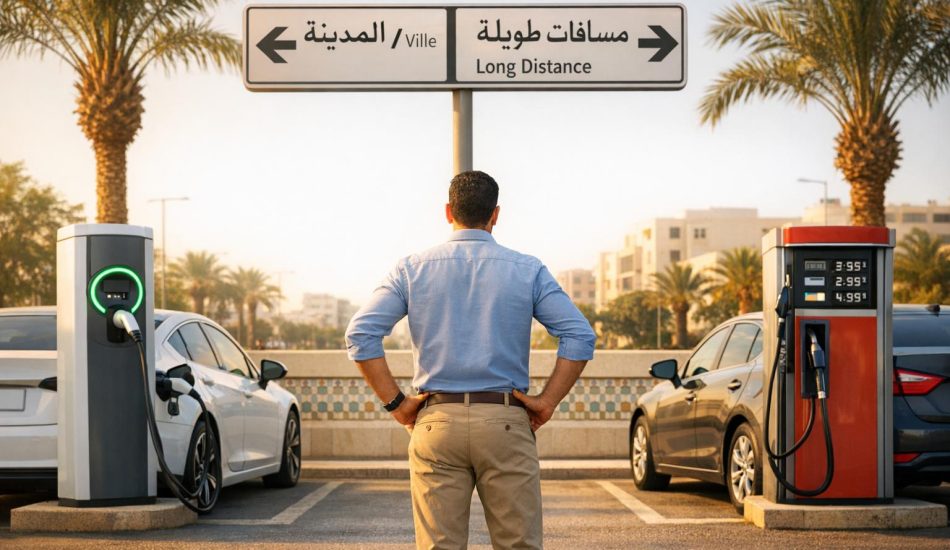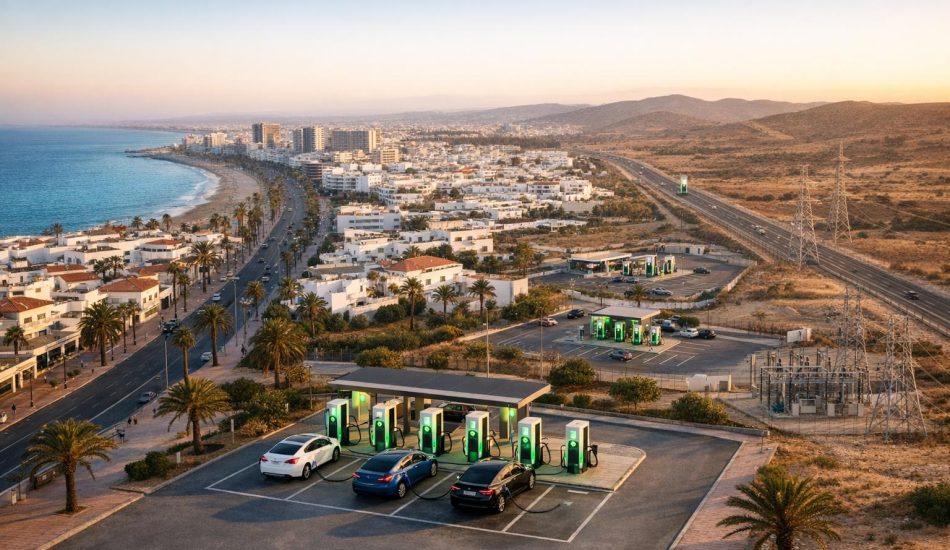
Electric vehicles (EVs) are becoming more popular in Congo (Kinshasa), driven by the country’s role as a top supplier of cobalt for EV batteries. While the local market is still developing, there are growing options for buyers, including various models, charging solutions, and dealerships. However, challenges like limited charging infrastructure, import costs, and road conditions remain. Here’s what you need to know:
- Top Models: Options range from affordable EVs like the Nissan Leaf ($28,040+) to luxury models like the Lucid Air Grand Touring ($109,900).
- Charging Infrastructure: Public charging stations are limited, but home chargers (costing $800–$1,500) are a practical solution.
- Costs: Import duties, shipping fees, and local taxes significantly impact EV prices. Used EVs can be a budget-friendly option.
- Where to Buy: Platforms like EV24.africa offer online access to EVs with transparent pricing, while local dealerships provide hands-on support.
EV ownership in Kinshasa requires careful planning due to infrastructure gaps and road conditions. However, with government initiatives and private investments, the market is gradually improving, making 2025 a promising time to consider going electric.
DR Congo woos foreign investors to boost local production of electric vehicles and batteries
Electric Vehicle Market in Congo (Kinshasa): Current Status
The electric vehicle (EV) market in Congo (Kinshasa) is still in its infancy. Adoption faces hurdles, particularly in infrastructure and policy, though efforts to address these issues are gradually gaining momentum. Projections suggest that the regional EV charging market could grow significantly, from $162.5 million in 2024 to nearly $380.7 million by 2029. This sets the stage for understanding how local initiatives are shaping the future of EVs in the region.
Government Policies and Tax Benefits
The government of the Democratic Republic of Congo (DRC) is beginning to take steps to encourage EV adoption. One key initiative is the establishment of "EV-free zones" in major cities and industrial hubs. These zones are being strategically developed to prioritize the construction of charging stations. While widespread tax breaks or subsidies for EV purchases are not yet available, the creation of these zones signals a growing commitment to building the necessary infrastructure for electric mobility. However, the success of these efforts hinges on improving the electrical grid and ensuring a steady supply of renewable energy.
Charging Stations and Infrastructure
At present, the EV charging infrastructure in the DRC remains sparse.
"The limited EV charging stations pose a barrier to adoption."
Despite this challenge, several startups in the country are actively working to expand the charging network, showing promising signs of progress. The government recognizes that scaling up this infrastructure is critical to enabling a broader transition to EVs.
However, there are significant obstacles to overcome. High costs, regulatory challenges, and an unreliable electricity supply continue to impede progress. Partnerships with private sector stakeholders and international investors will be crucial to addressing these issues.
For potential EV buyers, these limitations underscore the importance of considering alternative solutions. Installing home charging equipment may be a practical option, given the scarcity of public charging stations. While the situation is expected to improve as initiatives like EV-free zones take shape and private companies expand the charging network, prospective EV owners should prepare for a landscape that is still in development.
Best Electric Car Models Available in 2025
By 2025, the electric vehicle (EV) market will feature nearly 70 models from 30 different brands. For buyers in Congo (Kinshasa), choosing the right EV means considering factors like how well it handles local conditions, its practical driving range, and overall reliability. With advancements in battery technology, the average EV now offers a range of nearly 300 miles on a single charge – perfect for both daily commutes and longer trips.
When selecting an EV for Congo (Kinshasa), it’s important to account for road conditions, the impact of climate on battery life, and charging infrastructure availability. Harsh conditions can reduce an EV’s range by 10–30%, but even under such circumstances, most models still retain over 60% of their capabilities.
Top Electric Car Brands and Models
Several well-known brands are leading the charge in the EV market. Tesla stands out for its cutting-edge technology and extensive Supercharger network, making it a top choice in urban settings. BYD has gained attention for offering budget-friendly EVs with competitive range and essential features. Meanwhile, Hyundai is recognized for its fast-charging capabilities, and Toyota continues to appeal to buyers with hybrid-electric options, ideal for areas with limited charging stations.
For a more affordable yet reliable option, Nissan offers its Leaf models, starting at $28,040 for the S variant and climbing to $36,190 for higher trims. Chevrolet delivers excellent value with the 2025 Equinox EV, which provides a range of 319 miles and starts at $33,600. For buyers prioritizing range and luxury, the 2025 Lucid Air Grand Touring leads the pack with an EPA-estimated range of 512 miles, though its $109,900 price tag places it firmly in the premium category.
Here’s a quick comparison of some top models:
Model Comparison Table
| Model | Range (Miles) | Starting Price (USD) | Key Features | Best For |
|---|---|---|---|---|
| Nissan Leaf (S model) | – | $28,040 – $36,190 | Reliable, affordable entry point | City driving, first-time EV buyers |
| Chevrolet Equinox EV | 319 | $33,600 | Long range, competitive pricing | Daily commuting, value seekers |
| Lucid Air Grand Touring | 512 | $109,900 | Exceptional range, luxury features | Luxury buyers, range priority |
These models cater to a range of needs, from affordability to performance, making them suitable for Kinshasa’s unique conditions. However, buyers should also consider potential import fees and local taxes when purchasing an EV in Congo (Kinshasa). Additionally, many electric and plug-in hybrid vehicles qualify for commercial leasing incentives, which could lead to significant savings.
"Two-thirds of respondents in a recent Bloomberg survey indicated that 300-plus miles of range was enough for their needs".
This insight underscores that most of the models listed above can meet the daily driving demands of Congo (Kinshasa) residents, even accounting for conditions that might slightly reduce range. When narrowing down your options, focus on features like efficient air conditioning (a must in tropical climates), sufficient ground clearance (for uneven roads), and charging flexibility (to adapt to the current infrastructure).
Electric Car Prices in 2025: Complete Price Guide
Understanding the cost of electric vehicles (EVs) in Congo (Kinshasa) goes beyond just the sticker price. Local factors play a big role in determining the final cost, and buyers in Kinshasa face unique challenges when navigating these variables. Platforms like EV24.africa simplify this process by offering clear pricing comparisons from various sellers. This helps buyers get a better sense of the actual market value of EVs in the region, which is crucial given the complexities of importing vehicles. Now, let’s break down how prices vary between new and used EVs.
New and Used EV Price Ranges
New EVs come in a variety of price points. Entry-level models are more budget-friendly, while mid-range options typically offer better features and longer driving ranges. At the top of the market, luxury EVs deliver high-end performance and advanced technology, but their price tags tend to limit them to a smaller group of buyers.
Used EVs, on the other hand, are often a more affordable option. However, the price drop depends on the make, model, and condition of the vehicle. When buying used, it’s essential to check the battery health and any remaining warranties, as battery performance can degrade over time and significantly impact the car’s value.
What Affects EV Pricing
Several factors influence the cost of EVs in Congo (Kinshasa):
- Import duties: These are a significant part of the price. Tariffs vary depending on the vehicle’s age, engine size, and country of origin, often adding a substantial amount to the base cost.
- Currency fluctuations: The exchange rate between the Congolese franc and major currencies directly affects pricing. Dealers frequently adjust their prices to account for these changes.
- Shipping and logistics: Costs for international transport, handling, and delivery within the country add to the overall expense of imported EVs.
- Local taxes and fees: Registration, inspection, and municipal charges all contribute to the final price.
- Dealer markups and financing options: The way dealers price and finance vehicles can also affect what buyers pay.
- Battery technology: Newer battery systems often come with higher upfront costs but offer longer lifespans and lower replacement expenses compared to older technologies.
- Government incentives: Congo (Kinshasa) offers limited subsidies or incentives for EV buyers, meaning most pay full market prices.
- Timing of purchase: Seasonal promotions, new model launches, and inventory cycles can also influence pricing, making timing an important consideration.
For the latest and most accurate pricing details, buyers should check EV24.africa. The platform provides transparent pricing along with detailed vehicle information, ensuring buyers can make well-informed decisions.
sbb-itb-99e19e3
Where to Buy Electric Cars in Congo (Kinshasa)
If you’re in Kinshasa and considering an electric vehicle, you have a few solid options to explore. Whether you prefer the convenience of online shopping or the hands-on experience of visiting a dealership, both approaches come with their own perks. Let’s break it down.
Local Dealerships and Online Platforms
Online platforms are gaining traction in Kinshasa, making it easier than ever to find your ideal electric car. For instance, EV24.africa connects buyers with verified dealers. This platform offers transparent pricing, detailed vehicle information, and even flexible financing options – all from the comfort of your home.
On the other hand, traditional dealerships in Kinshasa are also stepping into the EV market. While their inventory might not be as extensive as online platforms, they bring other advantages to the table. You can consult with experts face-to-face, inspect vehicles on the spot, and benefit from reliable after-sales services.
Ultimately, online platforms give you variety and convenience, while local dealerships offer a more personal touch and dependable support. Up next, we’ll dive into tips to help you get the most out of your EV purchase.
EV Ownership Tips for Congo (Kinshasa)
Owning an electric vehicle (EV) in Kinshasa comes with its own set of challenges and opportunities. To make the most of your EV, you’ll need to focus on charging solutions, maintenance, and adapting to local road conditions. Here’s how to keep your EV running smoothly in Kinshasa.
Installing Home Charging Stations
For charging at home, Level 2 charging stations are your best bet. They use a 240-volt outlet and can fully charge most EVs overnight, delivering power 3 to 7 times faster than a standard household outlet. However, before installation, have a certified electrician evaluate your home’s electrical system. Many homes in Kinshasa may require upgrades to handle the extra power load. Expect installation costs to range between $800 and $1,500, which includes the charging unit and professional setup.
If home charging isn’t feasible, Kinshasa’s public charging network is growing. Areas like Gombe and Limete are seeing more stations pop up, especially near shopping centers and the city center. Plan your routes around these stations and use apps to locate available chargers.
For emergencies, keep a portable Level 1 charger in your vehicle. While slower – adding only 3 to 5 miles of range per hour – it can be a lifesaver when no other options are available.
EV Maintenance and Repairs
One of the perks of EVs is reduced maintenance compared to gas-powered cars. However, in Kinshasa, finding qualified service centers requires some planning. Battery care is particularly important, as replacing a battery can cost anywhere from $5,000 to $15,000, depending on your vehicle model.
Most EV manufacturers offer warranties of 8 years or 100,000 miles on battery packs. To prolong battery life, keep charge levels between 20% and 80% and follow manufacturer guidelines. Document every service visit and keep detailed maintenance records.
For simpler tasks like tire rotations, brake inspections, or cabin air filter replacements, local auto shops can help. But for more complex issues, such as battery diagnostics, you’ll need to visit certified EV technicians or authorized service centers.
Spare parts can sometimes be hard to find in Kinshasa. Work with dealers who stock parts locally or can quickly ship them from regional suppliers. Platforms like EV24.africa are good options for sourcing parts and checking service coverage in your area.
It’s also a good idea to build relationships with multiple service providers. Some EV owners in Kinshasa even form informal networks to share recommendations and bulk-order commonly needed parts, ensuring they’re prepared for any situation.
Driving EVs in Local Conditions
Kinshasa’s tropical climate and road conditions can be tough on EVs, but with a few adjustments, you can keep your car running efficiently. For starters, high temperatures can reduce battery efficiency by 10-15%. To combat this, park in shaded areas whenever possible and use pre-conditioning features while your car is still plugged in.
On the city’s hilly terrain, regenerative braking can be a game-changer. This feature recaptures energy while braking, sending it back to the battery and extending your range. Mastering one-pedal driving techniques is especially useful in areas like Mont Ngafula.
During the rainy season, flooding can be a concern for any vehicle, including EVs. While EVs are generally well-sealed, avoid driving through water deeper than 6 to 8 inches. If you must cross a flooded area, maintain a steady speed and avoid stopping.
Traffic congestion in Kinshasa can actually work in your favor. Unlike gas engines, electric motors use minimal energy while idling. However, keep in mind that heavy use of air conditioning during peak traffic hours can drain your battery faster. Plan your trips accordingly to account for range limitations.
Dust and debris from unpaved roads can also cause issues, clogging air filters and affecting cooling systems. Clean these components more frequently and consider adding mud flaps or undercarriage protection if you regularly drive on rough roads.
Finally, power outages are common during the rainy season, so keep your EV charged above 50% to ensure you have enough range in case home charging becomes unavailable. Investing in a backup power source or a solar charging setup can provide extra peace of mind during extended outages.
Getting Started with Electric Cars in 2025
The year 2025 marks a pivotal moment for embracing electric vehicles (EVs) in Congo (Kinshasa). The Democratic Republic of Congo (DRC) plays a crucial role in the global EV market, supplying over 70% of the world’s cobalt – a key material in EV batteries. This natural advantage, paired with government-backed initiatives like "EV-free zones" designed to attract investment and cut carbon emissions, sets the stage for early adoption. These efforts align with the worldwide surge in EV demand.
On a global scale, the appetite for EVs is growing rapidly, with estimates suggesting 59–73 million vehicles could be on the road by 2035. In emerging markets like the DRC, EV sales are expected to drive mobility growth, with 80% of purchases representing new vehicle ownership rather than replacing traditional gas-powered cars.
For residents of Kinshasa, EVs offer practical, local solutions to some of the city’s biggest challenges. With the highest persons-per-car ratio among the world’s twenty most populous cities, Kinshasa faces significant traffic-related issues. Noise pollution is another concern, with levels ranging from 73 to 79 dB along major roads. The quieter operation of EVs can help alleviate these urban pressures, making city life more pleasant.
Accessing EVs has never been more straightforward. Platforms like EV24.africa simplify the buying process by offering a one-stop online marketplace featuring vehicles from leading brands such as Tesla, BYD, Leapmotor, and Hyundai. The platform provides clear pricing, detailed specifications, and financing options, allowing buyers to compare and purchase vehicles online. Delivery services extend across all 54 African countries, making it easier than ever to make the switch.
Beyond personal benefits, choosing an EV contributes to reduced emissions and cleaner air, aligning with the DRC’s broader sustainable development goals. As Kinshasa continues to expand its charging infrastructure, concerns about range anxiety are expected to fade, making EV ownership even more appealing.
Whether you’re considering a budget-friendly used model or a cutting-edge new EV, a combination of government support, improved infrastructure, and the convenience of EV24.africa makes 2025 the perfect time to embrace electric mobility in Congo (Kinshasa).
FAQs
What is the government of Congo (Kinshasa) doing to expand electric vehicle charging infrastructure?
The government of Congo (Kinshasa) is taking steps to boost the adoption of electric vehicles (EVs) by introducing policies that make EV-related costs more manageable. These include offering tax breaks and lowering import duties on EV equipment, making it easier and more affordable for people and businesses to embrace this technology.
On top of that, the country is working to set up more EV charging stations nationwide. At the same time, they’re focusing on training a skilled workforce to support the needs of the growing EV market. Together, these efforts aim to create a dependable charging network and lay the foundation for a thriving local EV industry.
How do Kinshasa’s roads and climate impact the performance and upkeep of electric cars?
Kinshasa’s roads present a tough challenge for electric vehicles (EVs). With potholes and unpaved areas being common, EV tires and suspension systems can wear out more quickly. That’s why it’s important to go for an EV built with sturdy components that can handle these rugged conditions.
The city’s hot and humid weather is another factor to consider. High temperatures can speed up battery degradation and lower efficiency. This makes having a solid cooling system and sticking to regular maintenance key for keeping your EV reliable over time. Opting for a model specifically designed for tropical climates can go a long way in addressing these concerns.
What costs should I consider, including hidden expenses, when buying an electric car in Congo (Kinshasa)?
When buying an electric car in Congo (Kinshasa), there’s more to consider than just the price tag. For starters, import taxes and registration fees can significantly increase the overall cost. On top of that, you may face expenses for specialized maintenance, as the availability of local expertise for electric vehicles is still developing. Another factor to think about is charging – whether you’ll need to install a home charging station or depend on public charging options, both of which could add to your budget.
There’s also a less obvious cost tied to the environmental and social impact of cobalt mining, a critical component in EV batteries. While this doesn’t directly hit your wallet, it raises important ethical questions about the broader implications of electric vehicle ownership. Understanding these aspects allows you to make a more thoughtful and informed choice.




